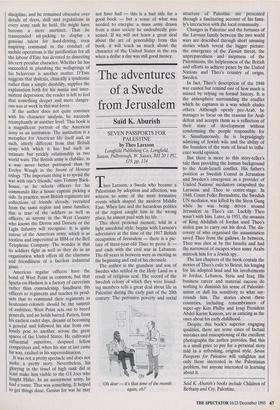The adventures of a Swede from Jerusalem
Said K. Aburish
SEVEN PASSPORTS FOR PALESTINE by Theo Larsson Longfield Publishing Co, Longfield, Sutton, Pulborough, W. Sussex, RH 20 1 PU, £19, pp. 124 Theo Larsson, a Swede who became a Palestinian by adoption and affection, was witness to some of the most formative events which shaped the modern Middle East. When fate and the hazardous politics of the region caught him in the wrong place, he almost paid with his life,
This short personal memoir, told in a light anecdotal style, begins with Larsson's adventures at the time of the 1917 British occupation of Jerusalem — there is a pic- ture of three-year-old Theo to prove it and ends with the civil war in Lebanon. The 60 years in between were as exciting as the beginning and end of his chronicle.
The author is the grandson and son of Swedes who settled in the Holy Land as a result of religious zeal. The record of the Swedish colony of which they were found- ing members tells a great deal about life in Palestine during the early part of the 20th century. The pervasive poverty and social
`Oh dear — it's that time of the month again, eh?'
structure of Palestine are presented through a fascinating account of his fami- ly's interaction with the local community, Changes in Palestine and the fortunes of the Larsson family between the two world wars are described through short amusing stories which reveal the bigger picture: the emergence of the Zionist threat, the unpreparedness and ineptness of the Palestinians, the helplessness of the British and efforts to achieve peace by the United Nations and Theo's country of origin, Sweden.
In fact, Theo's description of the 1948 war cannot but remind one of how much is missed by relying on formal history. It is the atmosphere surrounding the conflict which he captures in a way which eludes others. Although openly pro-Arab, he manages to focus on the reasons for Arab defeat and accepts them as a reflection of their state of development without condemning the people responsible for it. Simultaneously, he is begrudgingly admiring of Jewish wile and the ability of the founders of the state of Israel to influ- ence world opinion.
But there is more to this story-teller's tale than providing the human background to the Arab-Israeli conflict. His father's position as Swedish Consul in Jerusalem and Sweden's emergence as a provider of United Nations' mediators catapulted the Larssons and Theo to centre-stage. In 1948, Count Folke Bernadotte, the Swedish UN mediator, was killed by the Stern Gang while he was being driven around Jerusalem in Theo's car. Luckily Theo wasn't with him. Later, in 1951, the assassin of King Abdallah of Jordan used Theo's stolen gun to carry out his deed. The dis- covery of who organised the assassination saved Theo from the gallows. In between, Theo was shot at by the Israelis and had the narrowest of escapes when some Arabs mistook him for a Jewish spy.
The last chapters of the book contain the stories of Theo's exile to Beirut, his longing for his adopted land and his involvements in Jordan, Lebanon, Syria and Iraq. His business career and material success do nothing to diminish his sense of Palestini- anism or dull his sensitivity to what sur- rounds him. The stories about these countries, including remembrances of super-spy Kim Philby and Iraqi President Abdel Karim Kassem, are as enticing as the ones about his early childhood.
Despite this book's superior engaging qualities, there are some cases of factual mistakes and miscaptioning of the excellent photographs the author provides. But this is a small price to pay for a personal story told in a refreshing, original style. Seven Passports for Palestine will enlighten not only those interested in the Palestinian problem, but anyone interested in learning about it.
Said K Aburish's books include Children of Bethany and Cry, Palestine.










































































































 Previous page
Previous page